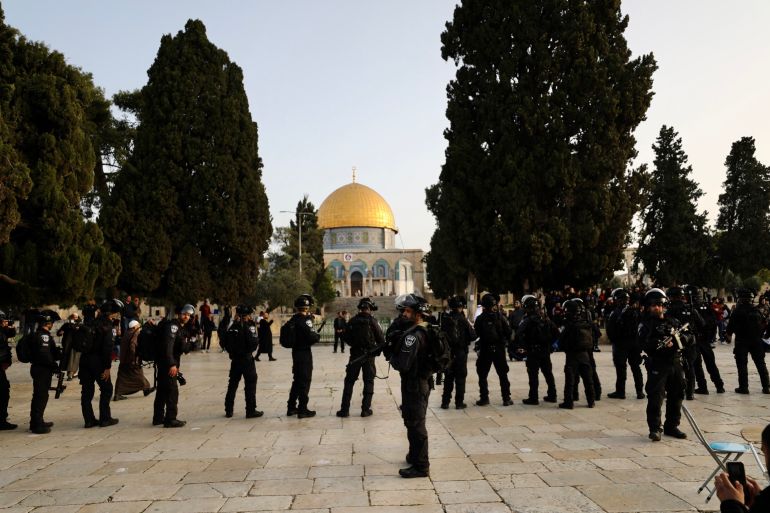Israeli forces raid Al-Aqsa mosque, over 40 Palestinians injured
Palestinian Red Crescent says 42 people have been injured on the last Friday of Ramadan at one of Islam’s holiest sites.

At least 42 Palestinians have been injured in a raid by Israeli police forces on the Al-Aqsa Mosque compound in occupied East Jerusalem, the Palestinian Red Crescent said, following weeks of violence at the flashpoint site.
The unrest came on the final Friday in the Muslim holy month of Ramadan. Most of those injured suffered “upper-body injuries” the Red Crescent said, adding that 22 people had been taken to hospital.
Keep reading
list of 3 itemsNew Israeli rules on foreigners visiting West Bank stir outrage
Palestinian killed during Israeli raid on Jenin camp
Israeli police said forces entered the compound after “rioters” hurled stones and fireworks, including down towards the Western Wall, the sacred Jewish site below Al-Aqsa.
Witnesses said police fired tear gas and rubber bullets.
Police said three people had been arrested, two for throwing stones and one for “inciting the mob”.
“For the past hour, the site has been quiet and [Muslim] worshippers are safely entering [the compound],” police said.
But tensions remain high at the site in the heart of Jerusalem’s old, walled city, part of Israeli-occupied East Jerusalem.
Over the past two weeks, nearly 300 Palestinians have been injured in Israeli incursions at the Al-Aqsa compound, Islam’s third-holiest site.
Muslim leaders have been angered by a recent uptick in the number of Israeli settlers entering the Al-Aqsa Mosque compound. The longstanding convention has been that only Muslims are allowed to pray at the compound, but, according to the Jerusalem Islamic Waqf, nearly 3,700 Israeli settlers have entered the Al-Aqsa Mosque compound over the past week to mark the Jewish festival of Passover.
Most Orthodox Jews do not pray inside the compound, believing it to not be religiously acceptable, and Jerusalem’s Chief Rabbinate also forbids prayer there. However, a growing number of Israeli religious nationalists have encouraged Jewish prayer on the site, with elements calling for the construction of a Jewish temple there.
The growing presence of the movement has led to many Palestinians fearing that Israel is seeking to divide the compound and create a space where Jews may worship.
In an apparent attempt to ease tensions, Israel’s foreign minister Yair Lapid has stressed that the government was committed to the status quo at the compound, and said that no plan to divide it exists.
However, Palestinians living in the occupied West Bank still face tough restrictions on visiting the Al-Aqsa compound, a national symbol for Palestinians, with travel being almost totally restricted for most of the year, and only allowed for certain age groups during Ramadan. In effect, this means that many Palestinians who live only miles away from East Jerusalem have never been able to visit.
Israel says that the measures are necessary for security reasons.
Increased raids in Ramadan
The fresh unrest comes on the last Friday of Ramadan, with the end of the Muslim holy month coming early next week.
Over the past two weeks, more than 250 Palestinians have been injured in incursions by Israeli police at Al-Aqsa.
Violence in Israeli-occupied East Jerusalem has raised fears of another armed conflict similar to an 11-day Israeli assault on Gaza last year which was triggered by similar unrest at the mosque.
Recent weeks have seen isolated rocket fire from Gaza towards Israel and Israeli reprisals, but no casualties reported on either side.
The Al-Aqsa tensions have come against a backdrop of violence since March 22 in Israel and the occupied West Bank and Gaza.
At least 26 Palestinians and three Palestinian citizens of Israel have died during the period, most of them in raids by Israeli security forces in the occupied West Bank.
Twelve Israelis and two Ukrainians were also killed in four separate attacks inside Israel. Two of the deadly attacks were carried out in the Tel Aviv area by Palestinians.
New settlement construction
Palestinian fears over the status of Al-Aqsa come as Israel authorised new settlement construction in the illegally occupied West Bank city of Hebron.
On Thursday, Israel’s High Court gave the green light for the construction of a 31-unit six-storey apartment complex for settlers in the heart of the city.
The court announced its decision after dismissing a petition against the project filed by the left-wing group Peace Now and the Palestinian-run Hebron Municipality.
“This new construction in Hebron is the first in twenty years that is being carried out inside the Palestinian city, in a compound that has been occupied by the army for years as a military base and is now being established as a settlement,” said Peace Now in a statement.
Construction began on the settlement in October.
Hebron is home to approximately 200,000 Palestinians, as well as 700 or so Jewish settlers. However, 20 percent of the city is under direct Israeli control, and Palestinians living in it, or passing through it, are subjected to checkpoints and a ban from travelling on several main streets, unlike the Jewish settlers.
Palestinians have pointed to the status of Hebron, and the division of the Ibrahimi Mosque in its centre, as evidence of their fears over the future of Al-Aqsa.